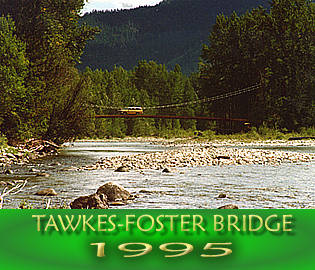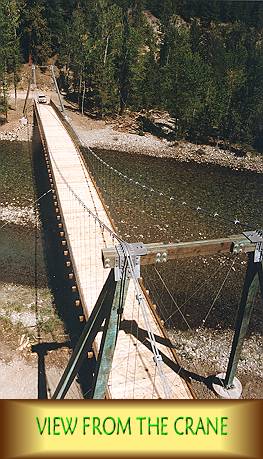 |
Use:
Light vehicle, pedestrian, equestrian, cyclist.
Span:
280'
Travel
width: 11'
Towers:
38' tall, ACZA treated #1 Douglas Fir.
Anchors:
34 cy concrete vault deadmen w/ twin 1-1/2" anchor rods.
Mainlines:
Twin 1-3/8", ASTM 586, 1x55 Bridge Strand each side.
|
|
The Tawlks-Foster
Suspension Bridge is a light-vehicle crossing of the Methow River near
Mazama, WA. The design is based on a traditional suspension bridge
concept with floor beam supported deck and lacking a stiffening truss.
Twin mainlines were used to facilitate construction and the A-frame
towers were chosen to increase tower stability during periods of heavy
snow loading and operation of snow grooming equipment. Managed by
the Methow Valley Sport Trail Association, the bridge is the primary crossing
of the Methow River, linking a network of more than 200 miles of trails.
Situated at the east-end of the North Cascade Highway in Washington State,
there are year-round activities in the Methow. Throughout the year
the bridge and trail system are open to hiking, cycling, and horseback
riding, and in the winter all 200+ miles of the system are groomed for
cross country skiing.
Construction
began in late fall, with excavation and pouring of the main anchors and
tower pylons ocurring in winter, during subzero temperatures. This
was necessary because the high water table and porous glacial soils of
the Methow Valley preclude deep excavations during any but the cold months
of the year, when water levels fall from lack of snow melt runoff. Construction
of the towers and mainspan resumed during the more seasonable spring and
summer months.
This project
was a collaborative effort between a number of partners, among them the
Methow Valley Sport Trail Association, Methow Institute Foundation, U.S.
Forest Service, Okanogan County, and the Interagency Committee on Recreation
for the State of Washington. Funding for the project was limited,
and Sahale worked closely with the clients to develop the most economical
design possible. The end result we have come to refer to as the
economy bridge: engineered and constructed at an astonishingly low
cost of $60 per square foot of deck area. Future planned upgrades
will bring the ultimate cost to under $100 per square foot. The
photos on this page show the completed bridge prior to and during dynamic
load testing with 7500 lb. vehicle. This test simulated the use
of the bridge by a Pisten Bully, or snow groomer, for which the 11' wide
travelway was designed.
|
 |

